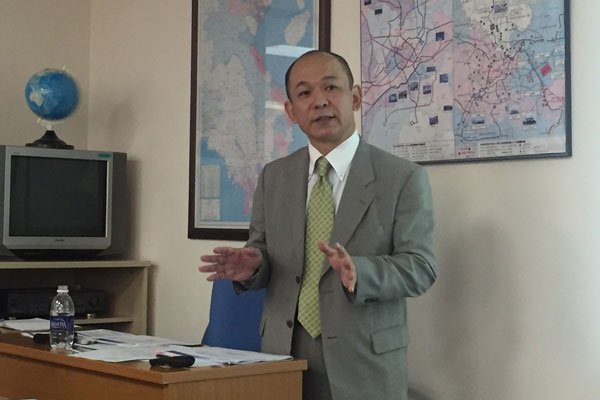Most Japanese enterprises have strong interest in the services and consumer goods sectors in Vietnam, and some two-thirds of Japanese firms active in the country plan to expand operations, showed a recent survey of the Japan External Trade Organization (JETRO).

Takimoto Koji, chief representative of JETRO in HCMC, talks about results of the organization’s new survey at a meeting with reporters in the city on February 14
JETRO yesterday announced findings from a survey among 10,983 Japanese companies in 20 markets in the Asia Pacific last year. Conducted in one month starting on October 11 last year, the survey was attended by 1,285 Japanese businesses active in Vietnam and 639 of them submitted valid responses.
Takimoto Koji, chief representative of JETRO in HCMC, said 66.6% of Japanese businesses in Vietnam said they were planning expansion in this market. The percentage was higher than in 19 other markets.
Koji said this was the second year Vietnam had registered the highest proportion of Japanese firms with expansion plans. “The result showed Vietnam continues to emerge as an important destination for Japanese investors.”
He explained 88% of respondents reported higher revenue and around 46% saw high growth potential. More than 60% of respondents said they were running at a profit, up four percentage points from the survey conducted in 2015.
As for the investment environment, the new survey indicated Vietnam has favorable conditions to attract investors and is ranked fourth (63.4%) out of 15 surveyed countries in terms of political and social stability. More than half of respondents highly assessed the market size and growth as well as low labor cost in Vietnam.
Language barriers to Japanese businesses in Vietnam are insignificant, said the survey.
Japanese firms said they faced less investment risks in the new survey than in 2015. However, JETRO noted that 60% of respondents were concerned about increasing labor cost in Vietnam as it would push up production costs although it would also lead to higher incomes for employees.
Koji expected consumer products, services and retail sectors would attract more Japanese investment as seen in the past years.
Figures showed consulting, distribution and information technology sectors attracted more than half of 336 new projects approved for Japanese firms last year. The number of projects registered by Japanese investors in the hotel and food and beverage sectors doubled in 2016 compared to 2015 while the number of manufacturing projects dropped by 28.
Despite the country’s improved investment environment, the survey found around 50% of respondents complained about unclear regulations and 40% pointed out administrative procedures were too complicated. Tax procedures should be streamlined.
According to the survey, the local content ratio of Japanese manufacturers in Vietnam was 34.2% in 2016, up slightly from 2015. It was higher than 31.6% in the Philippines but lower than 67.8% in China, 57.1% in Thailand and 40.5% in Indonesia.
Koji said investment pledges of Japanese firms in Vietnam in the past three years had been lower than in previous years but the number of projects had gone up. Notably, companies from the northeast Asian country pledged capital for a record of nearly 550 new and operational projects last year.
Japan’s small and medium enterprises got involved in a majority of new projects registered by companies from the northeast Asian country in Vietnam last year, with projects worth less than US$1 million each accounting for 70.8%, according to JETRO.
Koji noted the U.S. announcement to withdraw from the Trans-Pacific Partnership trade pact would not leave big impact on Japanese investment in Vietnam. Japanese businesses operating in this ASEAN market are looking to benefit from other free trade agreements between Vietnam and partners, especially the Vietnam-EU FTA.
SGT